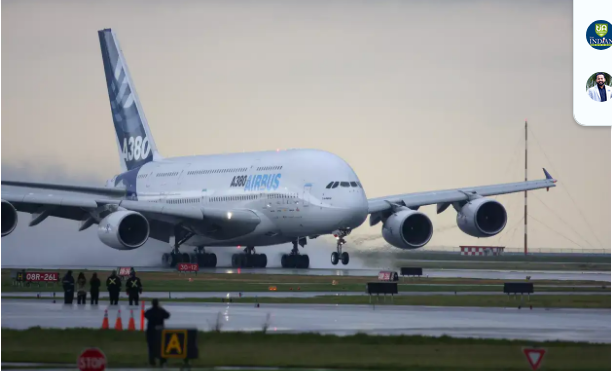
In a recent statement, Airbus CEO Guillaume Faury shared that the company remains confident about meeting its aircraft delivery goals for 2025, despite facing ongoing production delays and supply chain issues. This announcement has brought a sense of relief to the global aviation sector, which has been closely watching how jet manufacturers are responding to the increasing demand for planes in a post-pandemic world.
The CEO’s remarks confirm that Airbus is focused on maintaining its production pace and ensuring that customer commitments are met. According to Faury, the company is tackling challenges “one by one” and believes it is still in a strong position to deliver as planned.
Ongoing Challenges in Aircraft Manufacturing
Like many companies around the world, Airbus has been struggling with supply chain disruptions, which have impacted the availability of essential parts and materials. Delays in the delivery of engines, electronic components, and structural parts have affected the smooth assembly of aircraft. These problems have especially slowed down the production of the A320neo family, one of Airbus’s best-selling aircraft models.
Another concern has been the labour shortages in manufacturing hubs across Europe, the U.S., and Asia. Despite these setbacks, Airbus managed to deliver 735 aircraft in 2023, demonstrating its ability to manage large-scale production under pressure.
CEO Guillaume Faury’s Optimistic Outlook
During a press interaction in Toulouse, France, CEO Guillaume Faury reassured stakeholders that Airbus remains fully committed to its 2025 delivery target. He said, “We are confident in reaching our delivery targets for 2025. The road is not easy, but we are committed to solving issues one by one.”
Faury acknowledged that the supply chain remains tight, but added that Airbus has made significant improvements in coordinating with suppliers and adapting to changing circumstances. His message was clear: Airbus is not stepping back from its goals.
The Importance of the 2025 Goal
Airbus aims to deliver 75 single-aisle aircraft per month by 2025, which would mark a new production record for the company. This goal is vital to fulfilling the strong backlog of orders from airlines across the world. It’s also key to competing with U.S.-based Boeing, its main industry rival.
Reaching this target would not only bring in substantial revenue but also confirm Airbus’s position as a global leader in commercial aircraft manufacturing. Customers like IndiGo, Delta, Ryanair, and Turkish Airlines are depending on Airbus to meet their fleet expansion timelines.
Tackling Supply Chain Problems
To overcome delays, Airbus has taken several steps to improve its internal and external systems. The company has expanded its supplier network across different countries to reduce dependency on a single source. It has also implemented better inventory tracking systems to monitor parts and speed up the assembly process.
In addition, Airbus has invested in factory upgrades in Germany, France, China, and the United States. These improvements are helping boost efficiency while maintaining high safety and quality standards. By making these adjustments, Airbus is ensuring that its production remains resilient.
Role of Innovation and Technology
The Airbus CEO highlighted how technology and innovation are playing a crucial role in handling production challenges. The company is using digital twins—virtual models that simulate the assembly process—to identify inefficiencies early. It is also deploying AI-powered logistics tools that help streamline parts distribution.
Airbus is not just focusing on speed; it’s also building toward the future. The company is working on sustainable aviation solutions, including hydrogen-powered aircraft and eco-friendly materials. These innovations are aligned with its long-term vision for green aviation.
Strong Demand from Global Airlines
The demand for new aircraft is booming, especially in India, Southeast Asia, and the Middle East. Airlines in these regions are expanding rapidly to meet growing passenger traffic. As a result, Airbus has received massive bulk orders for fuel-efficient aircraft.
For instance, IndiGo placed an order for 500 aircraft, and Turkish Airlines signed a deal for 355 planes. Even Air India made a major purchase of 250 Airbus jets. These orders indicate the trust airlines have in Airbus and how important it is for the company to stick to its delivery schedule.
China’s Role in Airbus Strategy
China is playing a key role in Airbus’s production strategy. The company has expanded its final assembly line in Tianjin, making it easier to serve customers in Asia quickly. This move allows Airbus to cut delivery times and reduce pressure on its European plants.
China’s growing aviation market is a major opportunity for Airbus, and deeper partnerships in the region are expected to be beneficial in the long run.
Rivalry with Boeing
While Airbus is pressing ahead, Boeing is still recovering from a series of challenges, including safety concerns and production delays. Boeing’s ongoing issues with the 737 MAX have created space for Airbus to strengthen its position.
That said, the rivalry between Airbus and Boeing continues to shape the global aircraft market. Airbus knows it must stay consistent and reliable to maintain its lead.
Industry Reactions
Experts in the aviation sector have responded positively to Faury’s comments. Many believe that Airbus’s adaptability, innovation, and clear leadership are helping it stay on track. Analysts say that if Airbus meets its 2025 delivery goals, it will be a strong signal of the company’s manufacturing strength and market stability.
Investors and airline executives are watching closely, as timely deliveries directly impact airline schedules, revenue, and passenger satisfaction.
Airbus Financial Snapshot
Airbus’s financial results remain solid. In the first quarter of 2024, the company earned around €12.8 billion in revenue and recorded a net profit of €1.1 billion. With a backlog of over 8,000 aircraft, Airbus has a full pipeline for the coming years.
The company employs more than 130,000 people globally, showing its scale and capacity to execute large-scale production even during uncertain times.
Sustainability Remains a Priority
Even while ramping up deliveries, Airbus is committed to sustainability. The company is investing heavily in Sustainable Aviation Fuel (SAF), designing lighter aircraft, and pushing for net-zero emissions by 2050.
Airbus is also partnering with universities and startups to advance clean aviation technology. These efforts help the company appeal to environmentally conscious travelers and governments focused on green initiatives.
What Lies Ahead
The next 18 months are critical for Airbus. The aviation industry will be closely observing whether the company can maintain its current pace and reach its ambitious 75 planes per month goal by 2025.
If it succeeds, Airbus will not only meet customer expectations but also strengthen its position as the world’s leading aircraft manufacturer.
Despite facing global challenges like supply chain issues and labour shortages, Airbus remains confident about its 2025 delivery target. CEO Guillaume Faury’s leadership, combined with smart innovations and strong airline demand, has positioned Airbus to overcome current obstacles.
As travel continues to rebound and airline orders increase, Airbus’s performance will remain central to the future of aviation. The company’s ability to meet its delivery goals will signal more than success—it will show that it is ready for the future of flight.































